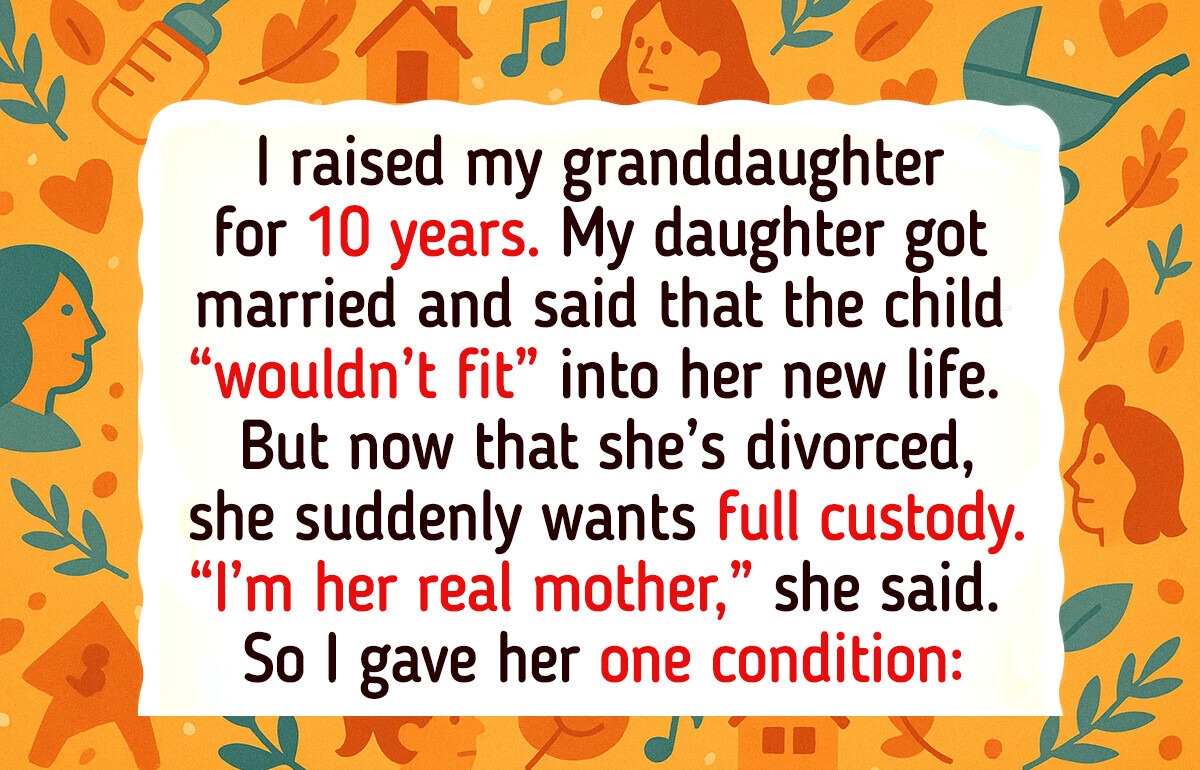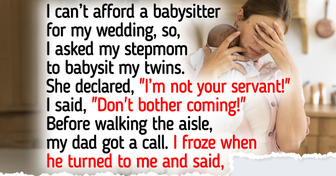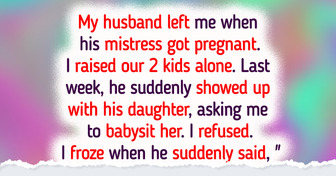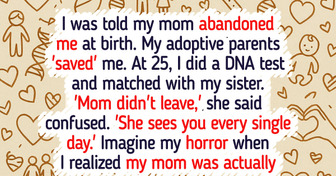11 True Stories That Took Us on an Emotional Roller Coaster


Raising a child is a huge responsibility, but what happens when a grandparent steps in while the parent is focused elsewhere? For one 58-year-old grandmother, this has been her reality for the past decade, as she’s cared for her granddaughter, Lily. Now, after a divorce and major life changes, Lily’s mother wants to reclaim her role. Let’s dive into this emotional family dilemma.
“I felt guilty when my daughter, Claire, became pregnant at 18, so I raised my granddaughter for 10 years while she focused on her life. At the time, I felt like I had somehow failed her as a parent—perhaps I was too lenient or didn’t prepare her well enough. Because of this, I was determined to support her in any way I could.
Now Claire is 28, and her daughter Lily is a bright, confident, and happy 10-year-old. Initially, I thought my role was temporary. I handled the late-night feedings, endless diaper changes, and doctor visits while Claire tried to get her life on track.
But as the years passed, Claire became less and less involved in Lily’s daily life. She started staying out more, and soon Lily was living with me full-time. Claire would visit on some weekends, but only when her schedule permitted. I never held it against her; I wanted her to have the space to build a successful life, and above all, I wanted Lily to have a stable and loving home.”
“When Lily was three, Claire got married. I honestly believed this would be the moment she would finally bring Lily into her home and create a proper family. I was shocked when, after the wedding, my daughter got married and said that the child ‘wouldn’t fit’ into her new life. She explained that her new husband wasn’t ready for kids.
Over the years, it became painfully clear that Claire saw herself as more of a ‘cool aunt’ than a mother. She would sometimes attend a school play or buy Lily an expensive birthday present, but she was never there for the hard stuff. The deep, maternal connection simply wasn’t there. I became Lily’s rock, her caregiver, and her mother in every way that truly mattered.”
“Recently, Claire’s life changed again. She and her husband divorced, and she bought a new house, landed a 9-to-5 job, and began spending more time with Lily. She started picking her up from school and having her over on weekends. While I appreciated her renewed effort, this sudden shift in routine has been incredibly stressful for my granddaughter. Lily has a well-established life with me, and this disruption has shaken her sense of stability.
Last week, Claire invited the entire family to my house for dinner—her sisters, their husbands, and all the kids. I assumed it was just a casual get-together, but it was something much bigger. In the middle of the meal, Claire stood up and made a toast. ‘I want to thank my mom for her incredible support,’ she began. ‘Without her help raising Lily for the past 10 years, I couldn’t have achieved what I have. But now that there’s nothing holding me back, I’m ready to be a full-time mom.’
She then announced that Lily would be moving in with her the following week and transferring to a new school near her house.”
“The biggest issue? Neither Lily nor I had been included in this decision. I couldn’t stay silent any longer. I stood up, calmly thanked her for her kind words, and then looked her in the eye. So I gave her one condition:
‘Of course, you can take Lily,’ I said, ‘but you have to ask her first. Uprooting a 10-year-old from the only home she has ever known—her school, her friends, and her routine—will be damaging if it’s not what she truly wants.’
Claire immediately dismissed my concern. ‘I’m her real mother,’ she said, insisting that she knew what was best. But she doesn’t know Lily, not like I do. She has never been there for the tough days or the quiet triumphs, and Lily has already told me she doesn’t want to move.
Now, Claire is livid. She accuses me of turning Lily against her and undermining her authority. My other daughters are caught in the middle, agreeing with me in principle but wishing I had handled it more privately. I’m left wondering if I’m wrong for standing my ground. Should I just step aside and let Claire take over, even if I believe it will hurt my granddaughter?”
“For context, we have no formal custody agreement. The entire arrangement has been based on Claire’s convenience. She has never paid child support, and I’ve covered at least half of the expenses of raising Lily myself. It has always been on her terms.
But now that she’s divorced, she suddenly wants full custody, claiming she’s ready to be a mother. And when I suggest we consider Lily’s feelings, she explodes. I have always encouraged their relationship and never spoken ill of Claire to Lily, but my granddaughter is old enough to see the situation for herself.
I love my daughter, but I know Lily deserves to have a voice in her own life. I’m at a loss for how to resolve this without breaking our family apart. What would you do?”
Thank you for sharing your story with us. It’s evident that your love and sacrifice have given Lily a wonderful life. Let’s address your personal story within the larger context of family dynamics and explore some lessons that could help others in similar situations.
When a parent is unable or unwilling to fulfill their duties, grandparents often step in out of love and a sense of duty. Your story is a powerful example of this. While Claire’s neglect may not have been malicious at first, it became a pattern that left you with the emotional and financial responsibility of raising Lily.
Navigating this without creating more conflict is tough. You have wisely chosen not to criticize Claire in front of Lily. However, it is crucial to have honest, private conversations with Claire about the real-world impact of her decisions. Acknowledge her recent efforts but continue to advocate for Lily’s stability as the number one priority.
Research shows that millions of grandparents are primary caregivers for their grandchildren. This arrangement comes with both rewards and challenges. Children often benefit from the wisdom, patience, and stability that grandparents provide. However, the role can also lead to physical exhaustion, financial strain, and complicated family dynamics, as your heartfelt story shows.
For Lily, you have been her constant—her source of unconditional love and security. Any changes to her living situation must be handled with extreme care to preserve the stability she has always known.
Yes, but it requires clear communication and well-defined boundaries. In many families, grandparents act as de facto co-parents when the primary parent, like Claire, cannot fully commit. The lack of a formal agreement in your family has made this situation much more difficult.
To avoid future turmoil, consider creating a shared parenting plan. It doesn’t need to be a legal document, but it should outline roles and responsibilities to ensure everyone is aligned and Lily’s needs are met.
Your family drama has created a rift between you and Claire. Resolving it will require empathy from both sides. Consider these steps:
Here’s another story of family conflict: I Secretly Fed My Vegan Sister’s Kids Meat — She Banned Me From All Family Events.











